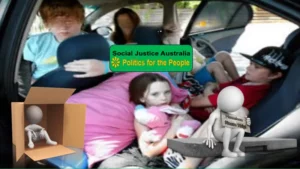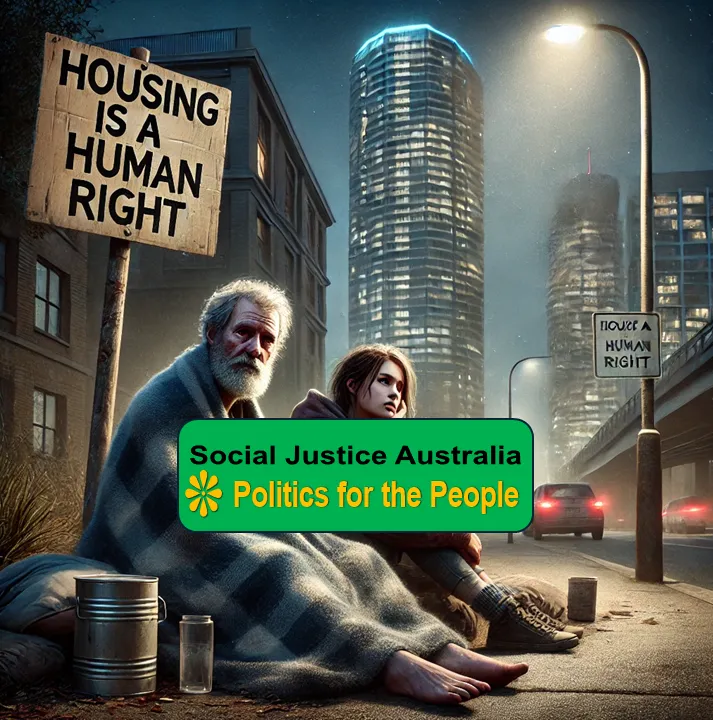Description
Homelessness is a social justice issue rooted in inequality. Learn how systemic failures in Australia create homelessness and how we can solve it.
Introduction
 Homelessness in Australia is often misunderstood as an individual failure, but in reality, it is a systemic crisis caused by economic inequality, policy failures, and corporate-driven housing markets. Despite Australia’s wealth, over 122,494 people were homeless in 2021, according to the Australian Bureau of Statistics.
Homelessness in Australia is often misunderstood as an individual failure, but in reality, it is a systemic crisis caused by economic inequality, policy failures, and corporate-driven housing markets. Despite Australia’s wealth, over 122,494 people were homeless in 2021, according to the Australian Bureau of Statistics.
This article explores homelessness as a social justice issue, highlighting its root causes, how policy choices contribute to it, and how we can create long-term solutions using Australia’s monetary sovereignty.
The Root Causes of Homelessness: A Systemic Issue
Economic Inequality and Housing Affordability
• Skyrocketing Housing Costs: Property investors, negative gearing, and rent inflation have made housing unaffordable for many Australians. The median rent in capital cities has risen by over 30% in three years.
• Wage Stagnation: While property prices rise, wages have failed to keep pace, pushing low-income workers and even middle-class families into housing insecurity.
• Financialisation of Housing: Housing is treated as an investment asset rather than a human right, leading to speculation and artificially inflated prices.
Government Policy Failures
• Underfunding Public Housing: Australia’s stock of public housing is shrinking rather than growing, with governments preferring to subsidise private landlords rather than invest in permanent housing solutions.
• Inadequate Social Welfare: The JobSeeker allowance remains well below the poverty line, making it impossible for unemployed individuals to afford rent.
• Tax Policies that Benefit the Wealthy: Negative gearing and capital gains tax concessions make housing a tool for wealth accumulation rather than shelter.
Job Insecurity and Underemployment
• Casual and Gig Economy Jobs: More Australians are in precarious work, making it harder to secure long-term housing.
• Decline in Union Power: The erosion of workers’ rights has weakened job stability and wage growth, pushing more people into poverty.
• Corporate Profit Over Workers: Major corporations continue to benefit from wage suppression while rental and living costs soar.
Homelessness as a Human Rights Violation
The Right to Shelter and Safety
• UN Declaration on Human Rights: Australia has ratified international treaties recognising housing as a fundamental right, yet our government continues to fail in meeting this obligation.
• Housing First Approach: Countries like Finland have successfully reduced homelessness by treating housing as a public good rather than a commodity.
Criminalisation of Homelessness
• Fining the Homeless: Local councils have introduced fines for sleeping rough, effectively punishing people for being homeless.
• Hostile Architecture: Public spaces are designed to deter homeless individuals from seeking shelter, reflecting a society that marginalises rather than helps the vulnerable.
Discrimination and Marginalised Groups
• Indigenous Australians: Indigenous people are overrepresented in homelessness statistics due to historical injustices and systemic racism.
• Women and Children: Domestic violence is a leading cause of homelessness for women, yet funding for women’s shelters remains inadequate.
• LGBTQ+ Youth: Young LGBTQ+ individuals face higher rates of homelessness due to family rejection and social stigma.
The Social and Economic Costs of Homelessness
• Strain on Healthcare: Homeless individuals have higher rates of chronic illness, costing the healthcare system millions.
• Increased Policing Costs: Criminalising homelessness does not solve the issue but increases policing and judicial expenses.
• Lost Economic Potential: Keeping people homeless prevents them from working, contributing to the economy, or improving their circumstances.
Solutions Rooted in Social Justice
Housing as a Public Good
• Government-Funded Public Housing: As a social justice issue, the government must invest in fully funded, publicly owned housing rather than subsidising private developers.
• Rent Controls and Housing Regulation: Implement rent caps and regulate landlords to prevent rent gouging.
Guaranteed Basic Income and Living Wages
• Raise JobSeeker Above the Poverty Line: No person should be homeless because social welfare payments are too low.
• Enforce Fair Wages and Secure Jobs: Stronger labour laws can prevent job insecurity and ensure that wages keep up with inflation.
Strengthening Community Support Systems
• Mental Health and Addiction Services: Many experiencing homelessness struggle with mental health or addiction, requiring better-funded support programs.
• Wraparound Services: Providing housing, healthcare, and employment support together leads to long-term stability.
Conclusion
Homelessness is a social justice issue and is a direct result of government policy choices, corporate-driven economic inequality, and a failure to recognise housing as a human right. Addressing this issue requires political will, investment in public housing, and an economic model that prioritises people over profit.
Thought-Provoking Question
What steps can Australia take to guarantee housing as a fundamental right rather than a privilege?
Call to Action
Do you see opportunities for community-driven change in Australia’s dollar sovereignty?
If you found this article insightful, explore more about political reform and Australia’s monetary sovereignty on Social Justice Australia: https://socialjusticeaustralia.com.au/
Share this article with your community to help drive the conversation toward a more just and equal society.
Click on our “Reader Feedback” menu. Let us know how our content has inspired you.
Support Social Justice Australia – Help Keep This Platform Running
Social Justice Australia is committed to delivering independent, in-depth analysis on critical issues affecting Australians. Unlike corporate-backed media, we rely on our readers to sustain this platform.
If you find value in the content we provide, consider making a small donation to help cover the costs of hosting, maintenance, and continued research. Every contribution—no matter how small—makes a real difference in keeping this site accessible and ad-free.
💡 Your support helps:
✅ Keep this website running without corporate influence
✅ Fund research and publishing of articles that challenge the status quo
✅ Expand awareness of policies that affect everyday Australians
💰 A one-time or monthly donation ensures Social Justice Australia stays a strong, independent voice.
🔗 Donate Now
Thank you for being part of this movement for change. Your support is truly appreciated!
Q&A Section
Q1: Why is homelessness considered a social justice issue?
A: Because it stems from economic inequality, policy failures, and systemic discrimination rather than individual failings.
Q2: What is the most effective way to end homelessness?
A: A Housing First policy, which prioritises permanent housing and wraparound social services.
Q3: How does Australia compare to other countries in tackling homelessness?
A: Countries like Finland have nearly eradicated homelessness through strong public housing investments, while Australia lags due to neoliberal policies.

